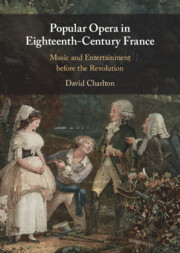Book contents
- Popular Opera in Eighteenth-Century France
- Popular Opera in Eighteenth-Century France
- Copyright page
- Dedication
- Epigraph
- Contents
- Illustrations
- Tables
- Examples
- Preface
- Acknowledgements
- Notes on the Text
- Abbreviations
- 1 Introduction
- 2 Music and Spoken Theatre
- 3 Music in Gherardi’s Company
- 4 Singing and Acting at Home
- 5 Opéra-comique en vaudevilles
- 6 Experiences of Popular Theatre
- 7 Comic and Serious Themes
- 8 Performance as History
- 9 Musical Expansion
- 10 Italian Inroads: The King’s Company
- 11 Six Methods of Synthesis
- 12 A ‘Musico-Dramatic Art’
- 13 Conclusions
- Stage Works Cited
- Bibliography
- Index
7 - Comic and Serious Themes
Published online by Cambridge University Press: 09 December 2021
- Popular Opera in Eighteenth-Century France
- Popular Opera in Eighteenth-Century France
- Copyright page
- Dedication
- Epigraph
- Contents
- Illustrations
- Tables
- Examples
- Preface
- Acknowledgements
- Notes on the Text
- Abbreviations
- 1 Introduction
- 2 Music and Spoken Theatre
- 3 Music in Gherardi’s Company
- 4 Singing and Acting at Home
- 5 Opéra-comique en vaudevilles
- 6 Experiences of Popular Theatre
- 7 Comic and Serious Themes
- 8 Performance as History
- 9 Musical Expansion
- 10 Italian Inroads: The King’s Company
- 11 Six Methods of Synthesis
- 12 A ‘Musico-Dramatic Art’
- 13 Conclusions
- Stage Works Cited
- Bibliography
- Index
Summary
Chapter 7 is a detailed critical study of comic and serious themes in popular operas. An Introduction establishes the philosophical basis of social critique in popular opera. A managerial shift in 1715 was made towards more intellectually engaging material, sometimes including social satire. This had been prominent in Gherardi’s theatre and was maintained in works by Alain-René Lesage, Philippe d’Orneval, Alexis Piron and Charles-Simon Favart. In ‘Recycling’ methods of reworking previous comedies are shown in two case studies involving Molière, Sedaine, Raymond Poisson and Louis Anseaume. A critical survey compares subjects and their treatment in fourteen works adapted from the Fables and Tales of La Fontaine. Evolving approaches to the poet’s material accompanied changing musical and moral approaches, for example in the depiction of poverty. In ‘Marriage as a Measure of Society’ a sample of eighteen popular operas discloses three areas of interest, though in very different comic modes: traditional resistance to impediments preventing marriage and happiness; resistance to the institution itself; and resistance to societal constraints which impede expectations of happiness. The influence of English drama is accounted for. A brief final section on ‘Abduction’ operas develops the wider implications of Jama Stilwell’s research on Letellier’s Arlequin Sultane favorite.
Keywords
- Type
- Chapter
- Information
- Popular Opera in Eighteenth-Century FranceMusic and Entertainment before the Revolution, pp. 156 - 183Publisher: Cambridge University PressPrint publication year: 2021

